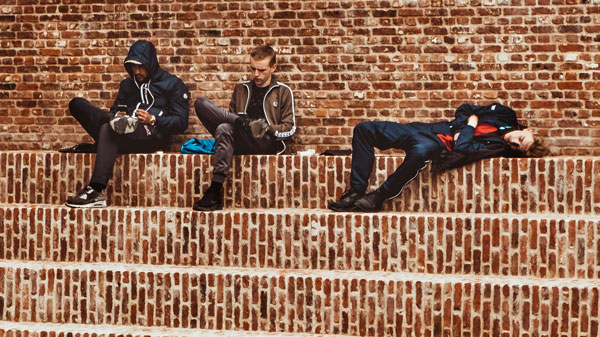
Much has been written about how best to prepare your child, and yourself, for the transition to college. This stockpile of guidance includes a Psychology Today piece, “Misdirection,” – which covers the ground from fretful parents to the shortage of mental health professionals on campus – and the New York Times article “Advice to My College Freshman” by Kelly Corrigan. It features humorous outtakes, such as “Granola bars have a lot of sugar,” “If you don’t wash your hair after swimming in chlorine, it will turn green” and “The stamp goes in the upper right-hand corner of the envelope” and more serious matters, such as, “When you’re in your dorm room, prop open the door so people can lean in,” and “When you’re walking around campus, put your phone in your backpack. Say hi. Saying hi is really good.”
(Photo credit:Maria Teneva on Unsplash)
All good thoughts for successfully launching your newly minted college student. And, although campus “drop-off” may seem like a rite of passage (it is), parenting continues – if in slightly different ways.
A critical piece of wisdom for young people is shared by Corrigan: “Be patient. College might end up being ‘the best four years of your life’ but that doesn’t mean there won’t be days where you feel aimless or lonely or maxed out.” Cue moms and dads.
The Jed Foundation, a nonprofit that addresses emotional health and suicide prevention for teens and young adults, worked with the Partnership for Drug-Free Kids and the Jordan Porco Foundation in surveying first-year students. They found that the majority of them feel unprepared emotionally for the challenges that college presents, with 45 percent agreeing with the statement, “It seems like everyone has college figured out but me.”
Of the emotional distress described by Corrigan, it may be the case that a pervasive sense of loneliness is another common denominator. A visit to parents’ weekend, though, might suggest otherwise with one’s son or daughter surrounded by a cadre of peers or offering a friendly hello to almost all passersby. Yet, those same young people sometimes report difficulty in replicating – in depth and granularity – the close-knit types of relationships they enjoyed at home. I refer to this phenomenon as “lonely but never alone.”
New York Times columnist Frank Bruni, in his September 2017 op-ed “The Real Campus Scourge,” writes, “Across the country, college freshmen are settling into their new lives and grappling with something that doesn’t compete with protests and political correctness for the media’s attention, something that no one prepared them for, something that has nothing to do with being ‘snowflakes’ and everything to do with being human.
“They’re lonely.”
Bruni goes on to ask the question, “Who would expect otherwise?” and posits that the answer is the young people themselves, largely due to the way college is “sold” to them.
In a related letter to the editor, parent Dana Cairns Watson says, “I always make a point of saying the college years are not the best years of their lives. That’s too much pressure …”
Pressure at a time they may already be struggling with loneliness. NBC News Learn highlights a national survey published by Cigna that sheds light on the magnitude of the problem, and Gen Zers (born between the mid-1990s and the early 2000s) lead the way. It states, “An astonishing 43 percent (that’s 2 in 5) Americans sometimes or always feel that their relationships are not meaningful, and that they are isolated from others. And 27 percent of Americans (that’s one in four) rarely or never feel as though there are people who really understand them.”
Using the UCLA scale on which scores above a 43 are indicative of loneliness, the Cigna poll found, scores rose among the generations, with the youngest generation, Gen Z or the iGen … scoring a 48.3 overall, as opposed to Millennials, who scored a 45.3., Gen X, who scored an also dismal 45.1 and Baby Boomers, who scored a 42.4. Those of grandparenting or great-grandparenting age, the Greatest Generation, were the least lonely, with a score of 38.6.”
Another recent poll, from YouGov, found that “30 percent of millennials say they feel lonely” and “22 percent said they had zero friends. Twenty-seven percent said they had ‘no close friends,’ 30 percent said they have no ‘best friends,’ and 25 percent said they have no acquaintances.” In contrast, the study found that only 16 percent of Gen Xers and 9 percent of baby boomers said they had no friends.
Ben Quincy, a 20-year-old student at Fairfield University told me about his first year at (a different) college, which he said was marked by anxiety and the pressure to perform. Like many young people, he found himself absorbed in a “party-culture” and began drinking heavily to “fit in” and to cope with his own sense of loneliness born of friendships that, by and large, did not measure up to those he had in high school.
Self-medication is, of course, quite common. A study conducted by the Center for Adolescent Research and Education (CARE) pointed to the beginning of college as a time when risk behaviors are common, in some cases establishing a “norm” for the remaining years of school.“ CARE reports, “More than one-third of first-year, first-semester college students report using alcohol – and many for the first time (26 percent) ...” Other drug use and sex are also cited by these students as behaviors they’ve engaged in, again often for the first time.
The National Institute on Alcohol Abuse and Alcoholism says, “Harmful and underage college drinking are significant public health problems, and they exact an enormous toll on the intellectual and social lives of students on campuses across the United States.”
“Drinking at college has become a ritual that students often see as an integral part of their higher education experience. Many students come to college with established drinking habits, and the college environment can exacerbate the problem. According to a national survey, almost 60 percent of college students ages 18-22 drank alcohol in the past month, and almost 2 out of 3 of them engaged in binge drinking during that same timeframe.”
Alcohol use – and abuse – is just one manifestation of the college experience. Other potential health risks revolve around diet, exercise and sleep habits.
So what can parents do?
First and foremost, encourage their college students to think ahead of time about the choices they want to make rather than succumbing to “spur of the moment” decisions that could derail their emotional and educational well-being. As Quincy said, “I needed to realize why I was doing certain things, such as drinking to be social, when I really didn’t need to do that. It wasn’t me.”
Second, parents can engage their students in conversation (and perhaps coaching) about making friends and finding mentors. A poll conducted by Elon University and its Center for Engaged Learning found that friendships with peers are instrumental. Similarly, building a “constellation” of mentors appears to make a significant difference. The results showed that “graduates who had seven to 10 significant relationships with faculty and staff were more than three times as likely to report their college experience as ‘very rewarding’ than those with no such relationships …
“The first year of college is crucial in establishing the foundation for these relationships, which will not only influence students’ time in college but a large part of the rest of their lives. In the Elon Poll, 79 percent of graduates reported meeting the peers who had the biggest impact on them during their first year of college. And 60 percent reported meeting their most influential faculty or staff mentors during that first year.”
Finally, Bruni offers some good counsel: “We urge new college students not to party too hard. We warn them of weight gain (‘the freshman 15’). We also need to tell them that what’s often behind all that drinking and eating isn’t celebration but sadness, which is normal, survivable and shared by many of the people around them, no matter how sunny their faces or their Facebook posts.”
Most important, we are well advised to tell our college students that, while they may experience loneliness, they are never truly alone.
REFERENCES
Bruni, F. (2017). The real campus scourge. The New York Times. September 2, 2017. https://www.nytimes.com/2017/09/02/opinion/sunday/college-freshman-mental-health.html?module=inline (1 Sept 2019).
Cairns Watson, D. (2017). Letter. Loneliness and the college experience. The New York Times. September 9, 2017. https://www.nytimes.com/2017/09/09/opinion/college-loneliness.html (1 Sept 2019).
CARE. (2019). Center for Adolescent Research and Education. Ecareforkids.org (1 Sept 2019).
Corrigan, K. (2019). Advice to my college freshman. The New York Times. August 13, 2019. https://www.nytimes.com/2019/08/13/well/family/advice-to-my-college-freshman.html (1 Sept 2019).
JED. (2019). Set to go. https://www.settogo.org/ (1 Sept 2019).
JED. (2015). Students Who Feel Emotionally Unprepared for College More Likely to Report Poor Academic Performance and Negative College Experience. The Jed Foundation. October 8, 2015. https://www.jedfoundation.org/first-year-college-experience-release/ (1 Sept 2019).
Lambert, L., Husser, J. and P. Felten. (2018). Mentors play critical role in quality of college experience, new poll suggests. The Conversation. August 22, 2018. https://theconversation.com/mentors-play-critical-role-in-quality-of-college-experience-new-poll-suggests-101861 (1 Sept 2019).
Manning-Schaffel, V. (2018). Americans are lonelier than ever – but ‘Gen Z’ may be the loneliest. NBC News. Better. May 14, 2018. https://www.nbcnews.com/better/pop-culture/americans-are-lonelier-ever-gen-z-may-be-loneliest-ncna873101 (1 Sept 2019).
NIAAA. (2015). College drinking. National Institute of Alcohol Abuse and Alcoholism. National Institutes of Health. https://www.niaaa.nih.gov/publications/brochures-and-fact-sheets/college-drinking (1 Sept 2019).
Resnick, B. (2019). 22 percent of millennials say they have “no friends.” Vox.com. August 1, 2019. https://www.vox.com/science-and-health/2019/8/1/20750047/millennials-poll-loneliness (1 Sept 2019).
Wallace, S. (2018). A user’s guide to the first year of college. Psychology Today. March 20, 2018. https://www.psychologytoday.com/us/blog/decisions-teens-make/201803/user-s-guide-the-first-year-college (1 Sept 2019).
Wallace, S. (2017). Misdirection. Psychology Today. October 25, 2017. https://www.psychologytoday.com/us/blog/decisions-teens-make/201710/misdirection (1 Sept 2019).
Wallace, S. (2014). Land of hopes and dreams. Psychology Today. August 4, 2014. https://www.psychologytoday.com/us/blog/decisions-teens-make/201408/land-hopes-and-dreams (1 Sept 2019).



























